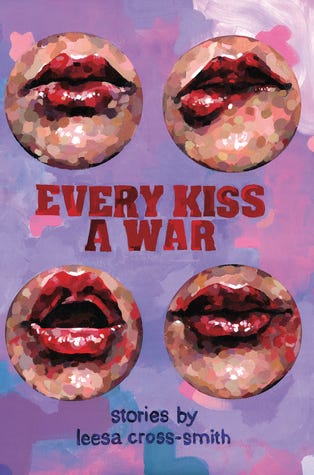Books to keep on your nightstand when your crush is so bad you can’t sleep
I n the first flush of infatuation, reading feels like an impossibility. Your attention is oh-so-scattered. Your soul throbs with nothing but a desire to think about this potential beau. Besides, as a genre, literary fiction presents the opposite of encouragement for your freshly-thrilled heart. In literature, love is fucked-up dysfunction, one that is beautiful only in prose and more so in death — like, say, Anna Karenina, which is perhaps one of the greatest tales of a stunning infatuation gone awry. Reading seems like at best a distraction from your feelings, at worst a denigration.
And yet, reading is possibly the best thing you can do after having a meet-cute with that someone that’s got you consumed. Obsession, another literary fiction preoccupation, only leads to excessive social media stalking and other kinds of indelicate and potentially ruinous behaviour: overtexting, trying to engineer chance encounters, and deep research into their exes. Books, as they do in life in general, will keep you chill in the heated early blush of fancying someone. To still your beating heart — just ever so slightly — I suggest Leesa Cross-Smith’s Every Kiss A War.

The collection comprises 27 stories mostly set in Kentucky and its environs, and features cowboys, veterans, and hippie chicks grappling with love. With libertine helpings of whiskey, coffee, and cigarettes throughout, the stories taste of sweet, sultry, and sometimes bitter trysts. Because there is nothing like a crush-induced episode of Attention Deficit Disorder, Cross-Smith’s stories offer a delicious remedy for your distracted focus. They are mostly tiny, some flash-length, some interlinked, and others spun a little further. You’re unlikely to waver from the page — even as your mind is intoxicated with dopamine from your last encounter.
Clearly possessing dreamy, tactile powers of sensory conjuring, Cross-Smith moves smoothly between each story so a one-sitting read is entirely possible. You enjoy a sense of accomplishment. If you’ve paid scant attention to work and life obligations because you’ve been daydreaming excessively, this might be an excellent thing. Cross-Smith’s prose, sultry and so sensual, will send you down the rabbit hole of fantasy. For example, these swirls of phrase from “Absolutely:” “His mouth tasted like thousand page-Russian novels I’d never read. When he kissed me I could hear the ocean and when he was gone I heard the sound of a flagpole chain in the wind, clinking against hollow metal.” All the feels of a new maybe-boo, in two sentences.

In Every Kiss A War, love rears up unexpectedly. Sometimes, like life, it’s complicated. In “And It Can Never Be Too Dark or Too Bright,” a woman is torn between two men, whom she christens “Tennessee” and “Kentucky.” West, the male lead of “The Wild Hunt,” becomes enamored with Zipporah even though he has a partner, Carla, who he can’t imagine marrying (amongst other reasons: he “always pictured my wife being taller”). Cross-Smith’s meanderings through these less-than-ideal situations remind that infatuation often arrives inconveniently — and might well screw up your life, or someone else’s, for better and worse. But still, it’s fun.
Until maybe it’s not. In “Un Jour Comme Un Autre,” Sam, a homesick American expat in Paris, falls in love with a French woman. Of their first coffee date, he recalls: “After coffee, dinner. After dinner, sitting and drinking red wine on her lush rug in front of the fire at her place. Later, more red wine, drunk and still drinking, talking for hours when he noticed the sky changing. Darker, lighter, light. He only touched her once that night. The small of her back as they walked into the restaurant. After that he never considered leaving France. Not until now.”
In the present he speaks of, Sam witnesses his now-wife falling in love with another man and decides move the family to New York. His wife falls in love twice and then a dreadful tragedy ensues. In the final moment of the story, he tells his daughter: “So Ona we need to pray for people, even when they hurt other people. Whether they mean to or not. His throat is thick. His voice, a small fire.” I turned this ending, much like the others in the book, around in my head for long after I read it. Even in the terrible frustration of his desire, Sam’s love for his wife and his little daughter feels so pure, allowing for resilience even when things go so very off. Thankfully, Cross-Smith gives him a second act in a subsequent story.
Leesa Cross-Smith is Taking Back Kentucky
Every Kiss a War’s endings recalled for me W.B. Yeats’ poem “Her Anxiety.” Yeats was no stranger to infatuation, having held a flame for the revolutionary Maud Gonne for most of his life.
All true love must die,
Alter at the best
Into some lesser thing.
Prove that I lie.
While Cross-Smith can’t quite prove that love doesn’t hurtle inevitably towards death, her stories present love’s possibilities — and that precious glimmer that even in endings, new thrills may come. Even if your infatuation doesn’t work out, there will be more to savor, even if it takes a while. This is true in life — and literature. In “Whiskey and Ribbons,” Evangeline mourns her dead husband while his adopted brother moves in with her. Cross-Smith went on to spin their sticky, steamy interactions into a novel by the same name, which was one of 2018’s most praised. Your crush may or may not turn into the love of your life. While you sit in absorbing suspension of all the possibilities of your as-yet-untested union, Every Kiss a War is a delightful and maybe more satisfactory diversion than speculative reveries. Regardless of the result, books are still probably the happiest of endings.
Alternatives
A Transatlantic Love Affair: Letters to Nelson Algren by Simone de Beauvoir
We fall in love — and certainly crush hard — in the negative space of our time with someone. How can you be desperate to be with someone if you’re not away from them? French intellectual Simone de Beauvoir, though with yoked Jean-Paul Sartre, fell for the Chicago writer Nelson Algren during a trip to his hometown. Their negative space was the entire Atlantic — in a time before Whatsapp or CheapoAir — so they wrote and wrote and wrote each other. They met in February of 1947, and by May that year, she wrote him: “I am your wife forever.” Her missives are full of her Parisian life and her longings for him, the latter of which if you are in the midst of a crush, might be extremely relatable. Hopefully, there is no ocean or overwhelming political commitments to overcome for you — but even if there is, surely things are more manageable and less dramatic than this. De Beauvoir wrote in September 1947:
I should give up travels and all kinds of entertainments, I should give up friends and the sweetness of Paris to be able to remain forever with you; but I could not live just for happiness and love, I could not give up writing and working in the only place where my writing and work may have a meaning… My love, this does not make any discrepancy between us; on the contrary, I feel very near you in this attempt to struggle for what I feel true and good, just as you do yourself. But, knowing it is all right, I cannot help nevertheless to cry madly this evening because I was so happy with you, I loved you so much, and you are far away.
The letters continued till 1964, that is for 17 years and through multiple books, transAtlantic sojourns, affairs, Algren’s marriage, and divorce. A doorstopper of a book, it’s often hilarious and should keep you occupied until you get your own romantic life worked out.
7 Novels About Love Triangles
Dept. of Speculation by Jenny Offill
Offill’s protagonist returns to the first bloom of her relationship with her husband. In meditative fragments, she observes the early thrill of getting closer to a new love interest: “You wanted to walk around the city, come rain come snow come sleet, recording things. I bought a warmer coat with many ingenious pockets. You put your hands in all of them.” And then later, when they have a child, the ardor transfers: “We dance with the baby every night now, spinning her round and round the kitchen. Dizzying, this happiness.” Inspirational but also very realistic if you have long-range plans with your current person of interest — especially since the story arc includes lice, bed bugs, and neglect.
How to Write an Autobiographical Novel by Alexander Chee
Infatuation doesn’t last forever; even if it morphs into full-blown love, normalcy awaits down the road. Bibliophilia is more easily indulged, pursued, and refreshed. Literature — reading it, attempting to write, and thinking about it — can be as satisfying as ruminating endlessly about a crush. Plus, in the aftermath of a crush not panning out or worse, ending bitterly, you might want to write all about it. (Ed. note: Electric Lit has a tote for that!) For craft wisdom alone, Alexander Chee’s collection of essays, which offers wisdom on things like writing, money, and roses, is supremely easy to get obsessed with. In “Inheritance,” an especially gorgeous journey through pain, cash, class, and family, I adored the trickster young Chee who finds a way to acquire chocolate even though he’s been barred from leaving his family’s compound in Seoul.


What to Read When You’re Infatuated was originally published in Electric Literature on Medium, where people are continuing the conversation by highlighting and responding to this story.
Source : What to Read When You’re Infatuated














